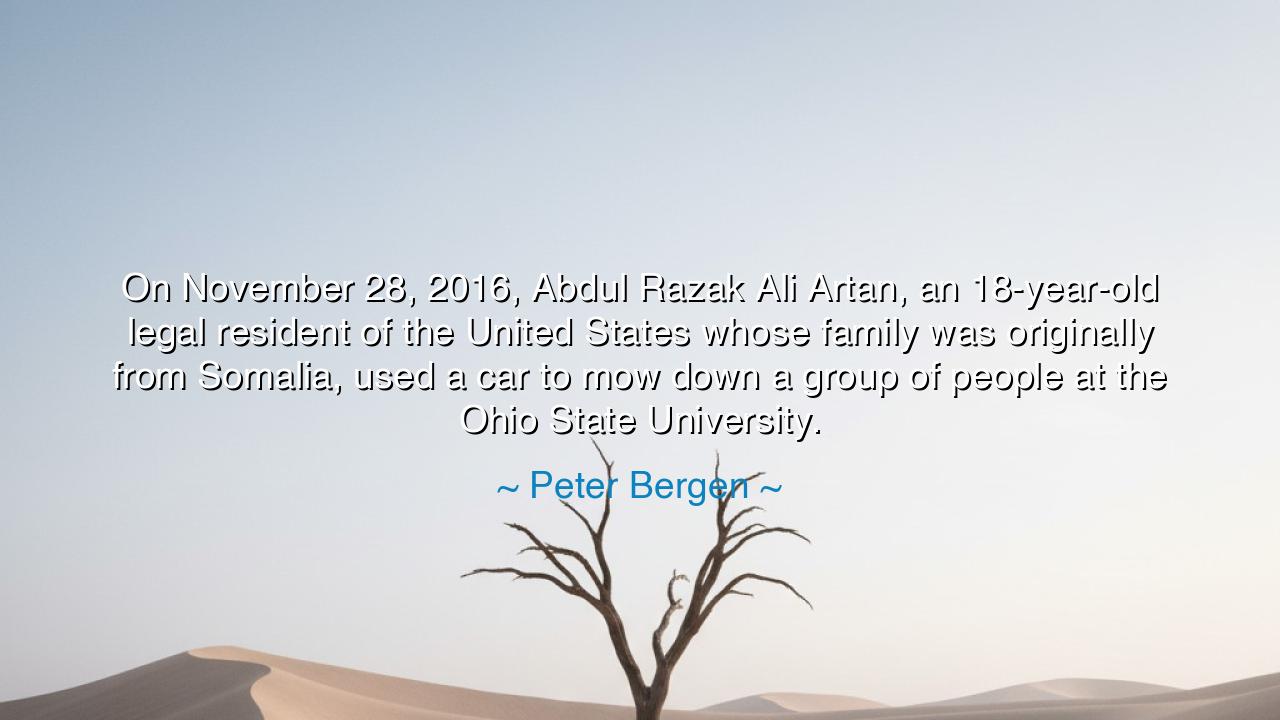
On November 28, 2016, Abdul Razak Ali Artan, an 18-year-old legal
On November 28, 2016, Abdul Razak Ali Artan, an 18-year-old legal resident of the United States whose family was originally from Somalia, used a car to mow down a group of people at the Ohio State University.






The words of Peter Bergen strike with the cold clarity of truth: “On November 28, 2016, Abdul Razak Ali Artan, an 18-year-old legal resident of the United States whose family was originally from Somalia, used a car to mow down a group of people at the Ohio State University.” Though spoken in the measured tone of a journalist, these words carry the weight of tragedy and the depth of human contradiction. Beneath the factual recounting lies a question that echoes through the ages — how does a young man, given safety, opportunity, and belonging, turn his hand to violence? What breaks inside the human spirit that transforms gratitude into rage, and shelter into destruction? Bergen’s words remind us that behind every act of terror, there is not merely ideology or circumstance, but a failure of understanding — a fracture between the world as it is and the world as the soul perceives it.
The origin of this quote comes from Bergen’s work as a journalist and terrorism analyst, chronicling modern radicalization and the human stories behind extremism. His mention of Abdul Razak Ali Artan is not to sensationalize horror, but to confront it — to hold a mirror to the fragility of peace in the modern world. Artan’s attack at Ohio State University, though brief, was a moment that revealed deep tensions in society: between inclusion and alienation, between faith and fear, between a person’s hope for belonging and their descent into hatred. Bergen’s careful description of Artan’s background — “a legal resident… whose family was originally from Somalia” — captures this irony. The boy had reached the land that millions dream of, yet within him burned the discontent of one who still felt unseen.
Such tragedies are not new. In every age, societies have faced the peril of the displaced soul, the one who stands at the threshold of belonging but feels forever outside the door. The Romans, too, once spoke of their conquered provinces and the “barbarians” who lived at their edges — not realizing that exclusion breeds resentment, and that resentment, left to fester, becomes rebellion. So too in our modern age, when nations receive refugees but fail to receive their hearts, when opportunity is offered but dignity is not felt, alienation becomes the seed of despair. Bergen’s quote is thus more than a report — it is a warning. A warning that the greatest danger to civilization often comes not from beyond its borders, but from the cracks within its walls.
To understand the depth of Bergen’s message, one might look further back — to the story of Victor Hugo’s Jean Valjean, who, though fictional, represents the same eternal struggle. Valjean was condemned by society not for his crime, but for his label. It was only when he was seen with compassion that his heart was redeemed. Artan, however, seems to have found no such redemption — caught between worlds, he descended into the abyss. Bergen, in recounting this story, does not excuse him; rather, he seeks to remind us that evil does not arise from nothing. It grows in silence, in misunderstanding, in the failure of empathy — until it explodes into acts that shock the conscience of nations.
And yet, Bergen’s account also speaks to the resilience of the society that endures such attacks. For even in the chaos of that day at Ohio State University, students, teachers, and police acted swiftly and bravely. They proved that where one heart turns toward destruction, many others turn toward courage and compassion. In the ancient world, such moments were seen as divine tests — the gods sending chaos to measure the virtue of the people. And time and again, humanity has shown that though evil strikes swiftly, goodness rebuilds quietly and endures.
The lesson in Bergen’s words, therefore, is twofold. First, we must never grow complacent in our comfort, forgetting those who live unseen among us — the isolated, the voiceless, the disillusioned. For the human spirit, when deprived of belonging, will seek it even in darkness. Second, we must remember that every society’s greatness lies not in its power to punish, but in its ability to understand and prevent. To build peace, one must go deeper than security; one must build connection, restore trust, and kindle hope. Laws may protect borders, but only compassion protects hearts.
So, to those who inherit this world, take heed of Peter Bergen’s reminder. Do not merely count acts of violence; seek their roots. Do not see the terrorist only as an enemy, but as a symptom of something broken in the human order. Stand firm against evil, but never forget to heal where it begins — in loneliness, in resentment, in despair. For as long as we learn only to defend and not to understand, such tragedies will repeat. But when we learn to listen — truly listen — we will transform fear into wisdom, and out of tragedy, build a peace that endures.






AAdministratorAdministrator
Welcome, honored guests. Please leave a comment, we will respond soon